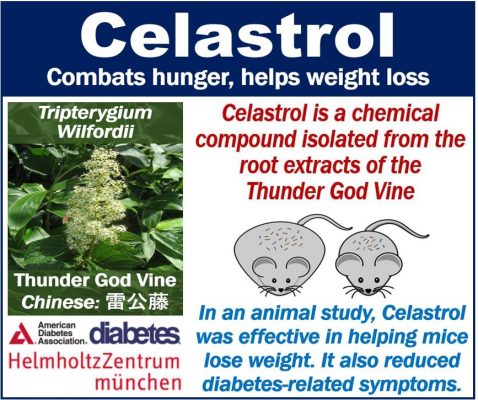Celastrol is a plant-derived substance that traditional Chinese medicine practitioners use. The substance has shown promise as an aid to weight loss, says a team of scientists. It may also help reduce the symptoms that patients with diabetes have.
Researchers at the Helmholtz Zentrum München – German Research Centre for Environmental Health have written about their study and findings in the journal Diabetes (citation below).
Helmholtz Zentrum München is a partner of DZD (German Center for Diabetes Research).
Celastrol may become an obesity treatment option
If Celastrol proves effective in clinical trials, the authors wrote, it could become a new treatment option for obesity.
The DAG advises obese patients to lose between 5% and 10% of their body weight annually. Precisely how much they should lose depends on their body mass index (BMI). DAG stands for Deutsche Adipositas Gesellschaft (German Association for the Study of Obesity).

Even though there is an abundance of dietary and lifestyle options, very few people reach their target body weight. In other words, despite lots of dietary and lifestyle options, most obese people trying to lose weight fail.
Dr. Paul Pfluger explains:
“Yet, breaking through this ‘magical barrier’ is so important, as it leads to an improvement in metabolism and accompanying metabolic diseases such as type 2 diabetes.”
Dr. Pfluger is last author, leader of this study, and head of the Neurobiology of Diabetes Department at the Helmholtz Zentrum München.
The researchers have shown that Celastrol leads to considerable weight loss in obese mice. It also significantly improves their diabetes-related symptoms.
Celastrol ‘switches on’ sensation of satiety
Dr. Pfluger and colleagues proved that Celastrol activates specific satiety centers in the brain. If you have a sensation of ‘satiety,’ it means you have a sensation of ‘fullness.’ In other words, you subsequently stop eating because you are no longer hungry.
These satiety centers in the brain play an important role in controlling body weight.
Regarding the effect of Celastrol, first author and student, KatrinPfuhlmann, Ph.D., says:
“Celastrol reactivates the body’s own mechanisms for controlling weight that would otherwise be switched off in obese individuals.”
“Normally those affected lose that feeling of fullness because the respective hormone – leptin – no longer has any effect.”
“Celastrol, the compound we examined, restores leptin sensitivity and thus the sense of satiety.”
Leptin, the hormone of ‘energy expenditure,’ is predominantly made by adipose cells. Leptin helps regulate energy balance by suppressing or inhibiting hunger.
When leptin receptors in the brain are active, we experience a sensation of fullness and subsequently stop eating.
Celastrol changed mice’s eating habits
The scientists also observed a major change in the eating habits of the obese mice.
Regarding the mice’s intake of food, Dr. Pfluger reports:
“The administration of Celastrol resulted in a much lower intake of food. Correspondingly, we observed an average loss of about ten percent in body weight within one week.”
Whether we can apply these findings to humans remains unclear, the researchers say. However, Dr. Pfluger, who is hopeful, says:
“Since the satiety hormone leptin has an almost identical effect in humans and mice, Celastrol has great potential.”
Celastrol won’t replace the changes in lifestyle and eating habits that are necessary for weight loss. However, it could help patients maintain their body weight. In other words, it could help prevent them from putting the weight back on.
Dr. Pfluger concludes:
“Relevant clinical trials are currently taking place in the United States, and we eagerly await the initial results.”
Citation
“Celastrol Induced Weight Loss is Driven by Hypophagia and Independent From UCP1,” Katrin Pfuhlmann, Sonja C. Schriever, Peter Baumann, Dhiraj G. Kabra, Luke Harrison, Sithandiwe E. Mazibuko-Mbeje, Raian E. Contreras, Eleni Kyriakou, Stephanie E. Simonds, Tony Tiganis, Michael A. Cowley, Stephen C. Woods, Martin Jastroch, Christoffer Clemmensen, Meri De Angelis, Karl-Werner Schramm, Michael Sattler, Ana C. Messias, Matthias H. Tschöp, and Paul T. Pfluger. Diabetes 2018 Aug; db180146. https://doi.org/10.2337/db18-0146.

